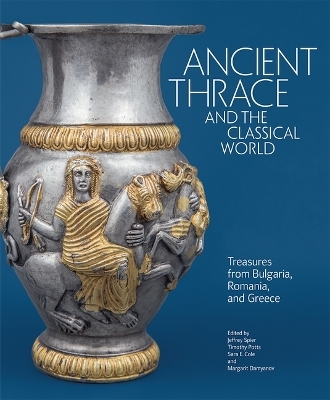
Thrace and the Classical World
Seiten
2024
J. Paul Getty Museum (Verlag)
978-1-60606-940-0 (ISBN)
J. Paul Getty Museum (Verlag)
978-1-60606-940-0 (ISBN)
- Noch nicht erschienen (ca. November 2024)
- Versandkostenfrei innerhalb Deutschlands
- Auch auf Rechnung
- Verfügbarkeit in der Filiale vor Ort prüfen
- Artikel merken
In this volume, experts explore Thracian royal tombs, the Greek colonization of the Black Sea coast, Thracian religion, and more, placing Thracian culture dating from around 1200 BC to the end of the first century BC, in a broader historical context that highlights its complex relationships with Greece, Persia, and Rome.
The Thracians-a collection of tribal peoples who inhabited territories north of ancient Greece, an area that comprises present-day Bulgaria, much of Romania, and parts of Greece and Turkey-were renowned for their skill as warriors and horsemen, as well as for their wealth in precious metals. Thracians left few written records, and knowledge of their history and customs has long been dependent on brief accounts from ancient Greek authors. They appeared in Greek myth as formidable adversaries in the Trojan War, cruel kings, and followers of the ecstatic god Dionysos. Spectacular archaeological discoveries made in Thracian lands during modern times, however, have provided firsthand evidence of this remarkable culture, illuminating Thrace's interactions with Greece, Persia, and Rome.Ancient Thrace and the Classical World reproduces more than two hundred glorious objects dating from the end of the Bronze Age, around 1200 BC, to the end of the first century AD, when Thrace became part of the Roman Empire. Experts explore topics such as Thracian royal tombs, the Greek colonization of the Black Sea coast, Thracian religion, and more, placing Thracian culture in a broader historical context that highlights its complex relationships with the surrounding region
EXHIBITION
J. Paul Getty Museum, Getty Center
November 6, 2024-March 3, 2025
The Thracians-a collection of tribal peoples who inhabited territories north of ancient Greece, an area that comprises present-day Bulgaria, much of Romania, and parts of Greece and Turkey-were renowned for their skill as warriors and horsemen, as well as for their wealth in precious metals. Thracians left few written records, and knowledge of their history and customs has long been dependent on brief accounts from ancient Greek authors. They appeared in Greek myth as formidable adversaries in the Trojan War, cruel kings, and followers of the ecstatic god Dionysos. Spectacular archaeological discoveries made in Thracian lands during modern times, however, have provided firsthand evidence of this remarkable culture, illuminating Thrace's interactions with Greece, Persia, and Rome.Ancient Thrace and the Classical World reproduces more than two hundred glorious objects dating from the end of the Bronze Age, around 1200 BC, to the end of the first century AD, when Thrace became part of the Roman Empire. Experts explore topics such as Thracian royal tombs, the Greek colonization of the Black Sea coast, Thracian religion, and more, placing Thracian culture in a broader historical context that highlights its complex relationships with the surrounding region
EXHIBITION
J. Paul Getty Museum, Getty Center
November 6, 2024-March 3, 2025
Jeffrey Spier is Anissa and Paul John Balson II Senior Curator of Antiquities at the J. Paul Getty Museum. Timothy Potts is Maria Hummer-Tuttle and Robert Tuttle Director of the J. Paul Getty Museum. Sara E. Cole is assistant curator of antiquities at the J. Paul Getty Museum. Margarit Damyanov is an associate professor in the Department of Thracian Archaeology at the National Archaeological Institute with Museum at the Bulgarian Academy of Sciences in Sofia.
| Erscheint lt. Verlag | 1.11.2024 |
|---|---|
| Zusatzinfo | 340 color and 10 b/w illustrations, 2 maps, 1 table |
| Verlagsort | Santa Monica CA |
| Sprache | englisch |
| Maße | 279 x 228 mm |
| Themenwelt | Kunst / Musik / Theater ► Antiquitäten |
| Geschichte ► Allgemeine Geschichte ► Vor- und Frühgeschichte | |
| ISBN-10 | 1-60606-940-3 / 1606069403 |
| ISBN-13 | 978-1-60606-940-0 / 9781606069400 |
| Zustand | Neuware |
| Haben Sie eine Frage zum Produkt? |
Mehr entdecken
aus dem Bereich
aus dem Bereich
auf den Spuren der frühen Zivilisationen
Buch | Hardcover (2023)
C.H.Beck (Verlag)
20,00 €
Konzepte – Methoden – Theorien
Buch | Softcover (2024)
UTB (Verlag)
39,90 €
Was Pompeji über uns erzählt
Buch | Hardcover (2023)
Propyläen (Verlag)
32,00 €


